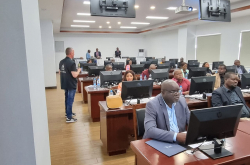Identifying suspects and witnesses
We analyse the terrorist use of social media platforms in order to enhance identification and detection efforts in national counter-terrorism investigations.
For example, we search social media platforms to identify potential witnesses, as was the case following the London Bridge attack in the UK in 2017, and the attack at a hotel complex in Nairobi, Kenya, in January 2019.
We are also exploring ways to use facial recognition technology to support member countries in their investigations. This technology offers new opportunities to share and compare data in order to identify terrorists, unknown persons of interest, and subjects who may appear in posts on social media channels.
Investigative training and resources
As part of our first joint project with the United Nations Counter-Terrorism Centre (UNCCT), we ran workshops for investigators covering four main areas:
- detecting terrorist-related activities online;
- collecting electronic records;
- requesting e-evidence across borders through police-to-police cooperation;
- engaging with the private sector to advance investigations by law enforcement agencies.
The workshops (conducted in 2018 and 2019) also served to enhance participants’ operational picture on the phenomenon of Foreign Terrorist Fighters (FTFs) more generally.
Complementing the workshops is a Handbook, jointly published by INTERPOL and UNCCT, entitled “Using the Internet and Social Media for Counter-Terrorism Investigations”. It offers investigators practical guidance on how best to generate online investigative leads and collect and preserve electronic records often across international borders to contribute to successful investigations and prosecutions.
This project was funded by the Governments of Japan, Saudi Arabia, and the United Arab Emirates.
Related news

Border security threats focus of STOP operations in Africa
8 December 2023




